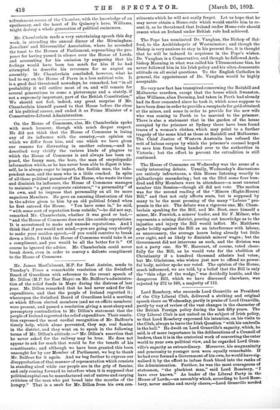The House of Commons on Wednesday was the scene of
a really interesting debate. Usually, Wednesday's discussions are entirely infrnctuous, a thin House listening wearily to philanthropic maundering ; but on the 23rd some four hun- dred and fifty Members were in attendance—a most unusual number this Session—though all did not vote. The motion was for the second reading of the "Miners (Eight-Hours) Bill," and that not only affects seats, but is supposed by many to be the most pressing of the many " Labour " pro- posals in the air. The debate was a vigorous one, Mr. Cham- berlain speaking for the Bill, and Mr. Burt, once himself a miner, Mr. Fenwick, a miners' leader, and Sir F. Milner, who
represents a mining district, pouring out knowledge as to the injustice and injury the Bill would inflict. Mr. Matthews spoke boldly against the Bill as an interference with labour, as unnecessary, the average hours being already but little over eight, and as likely to diminish miners' wages ; but the Government did not intervene as such, and the division was not a party one. Sir W. Harcourt, of course, voted cheer- fully for the Bill, as he would vote for the abolition of Christianity if a hundred thousand atheists had votes ; bat Mr. Gladstone, who wishes just now to offend no power- ful body, neither spoke nor voted. The opinion of the House, much influenced, we are told, by a belief that the Bill is only the "thin edge of the wedge," was decidedly hostile, and the dangerous Bill, which we have discussed elsewhere, was rejected by 272 to 160, a majority of 112.


































 Previous page
Previous page